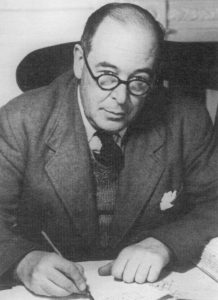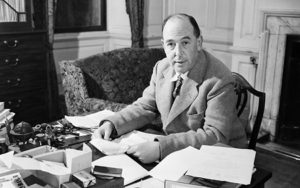 My upcoming book, America Discovers C. S. Lewis, deals with that famous author’s interactions with Americans and his attitude toward America as well. Early in his life, judging by comments in his letters, he had some prejudices against America and its citizens, but once he began exchanging views with American academics and receiving an abundance of letters from Americans who loved his books, one can see a decided shift in attitude.
My upcoming book, America Discovers C. S. Lewis, deals with that famous author’s interactions with Americans and his attitude toward America as well. Early in his life, judging by comments in his letters, he had some prejudices against America and its citizens, but once he began exchanging views with American academics and receiving an abundance of letters from Americans who loved his books, one can see a decided shift in attitude.
While he did critique some aspects of American society and government, one cannot truly evaluate a person’s views of another nation in a vacuum. Comparisons are necessary. What better way to evaluate Lewis’s views on America than to look also at his views on the Britain of his day?
If he entertained a low opinion of British government and culture, would we say he was anti-British? Or would he merely be pointing out the problems that needed to be corrected? In fact, Lewis’s comments on his native country appear to be far harsher than anything he said about America.
When American university professor Nathan Comfort Starr sought to bring Lewis to America and Lewis had to decline, he did invite Starr to Britain, but not with a sterling recommendation, referring to Britain as “this luckless country.”
In offering the same invitation to Warfield Firor, a famous surgeon at Johns Hopkins, the image of Britain he used in the letter was “this bleak island,” and he wondered why Firor would even want to visit it.
Why the bleak state of affairs? For Lewis, the blame fell on the Labour government and its socialist policies, which not only ruined the nation economically but was siphoning off its liberties and making Britain a less-than-stellar partner for the United States. As he explained to Firor, the government always seemed to be thinking of ways to take more liberties from the people. “Try not to judge us by our rulers,” he pleaded.
 By 1954, rationing in Britain finally came to an end, thanks to the new Conservative government. He informed Vera Gebbert, another regular American correspondent, that he wouldn’t be needing her gifts anymore, but there was a possibility, if she really missed sending him all those items, that she might be able to begin anew, noting that if the Socialists ever regained the majority, she could once again show her kindness “by supplying us, not with little luxuries, but with the necessities of life!”
By 1954, rationing in Britain finally came to an end, thanks to the new Conservative government. He informed Vera Gebbert, another regular American correspondent, that he wouldn’t be needing her gifts anymore, but there was a possibility, if she really missed sending him all those items, that she might be able to begin anew, noting that if the Socialists ever regained the majority, she could once again show her kindness “by supplying us, not with little luxuries, but with the necessities of life!”
He continued to sound the warning, such as when Gebbert was thinking of moving permanently to Britain. While they would be glad to welcome her, she needed to know the truth: there would always be the threat of a revival of a government ruled by the Socialists, “which would finish us off completely.”
When Mary Van Deusen wrote to ask him what he thought of the concept of loving one’s own country, his reply indicates a man striving to find the balance between nations and individuals. Love of country, he theorized, was primarily love for those with whom one had a lot in common.
He cautioned, “Mind you, I’m in considerable doubt about the whole thing. My mind tends to move in a world of individuals not of societies.” That tendency in Lewis’s mind to “move in a world of individuals” and “not of societies,” would also lend itself to a tendency not to wed oneself to stereotypes, whether of good traits in a people group or less-admirable ones. Whatever prejudices he may have had at the outset were set aside as he came to know more Americans.
If you find this subject of interest, there is more in my book. I’ll be sure to let you know when it is available.
